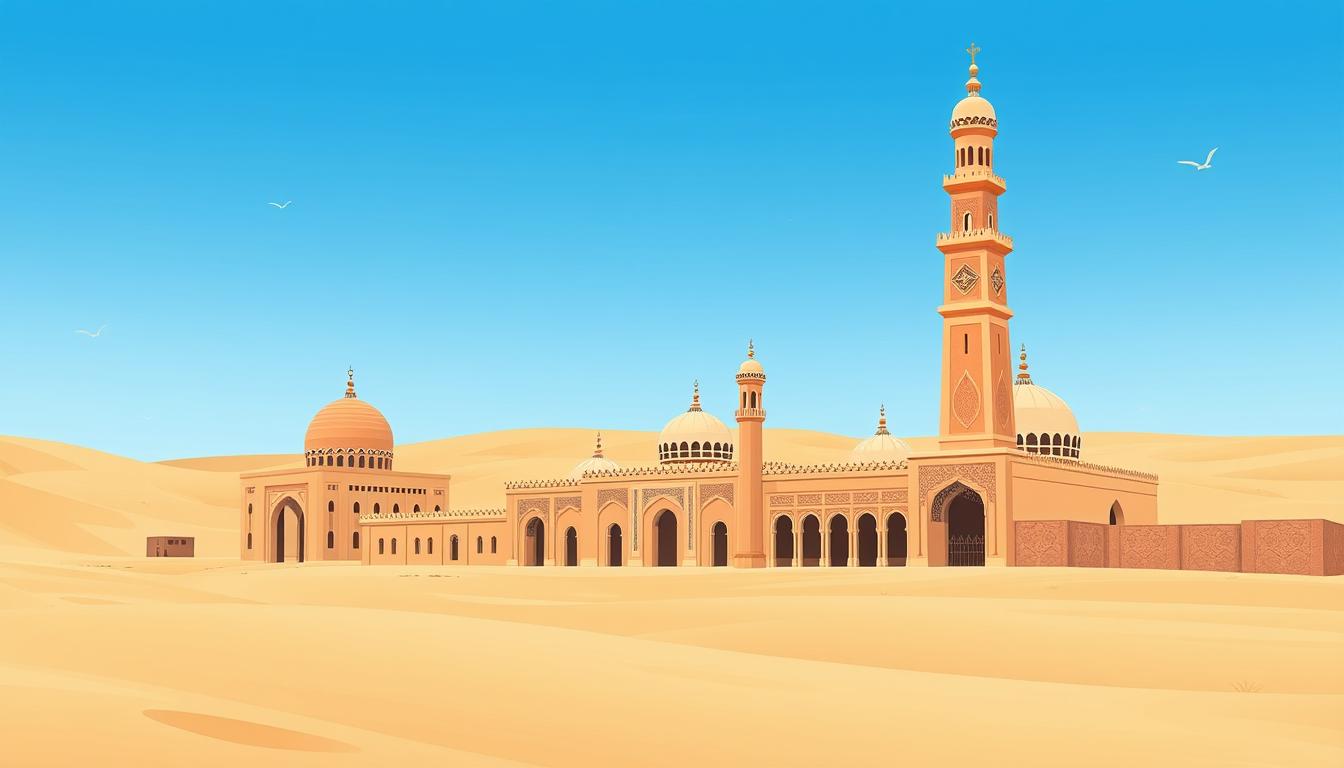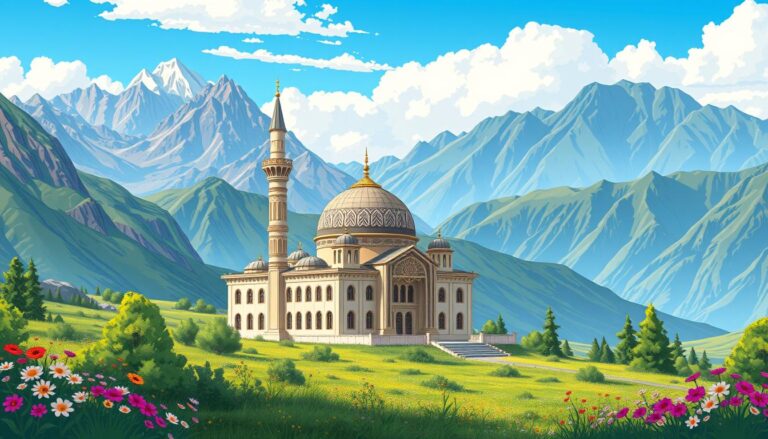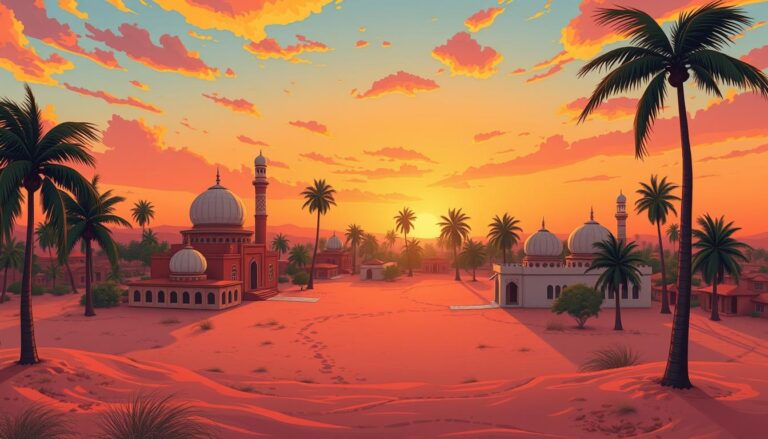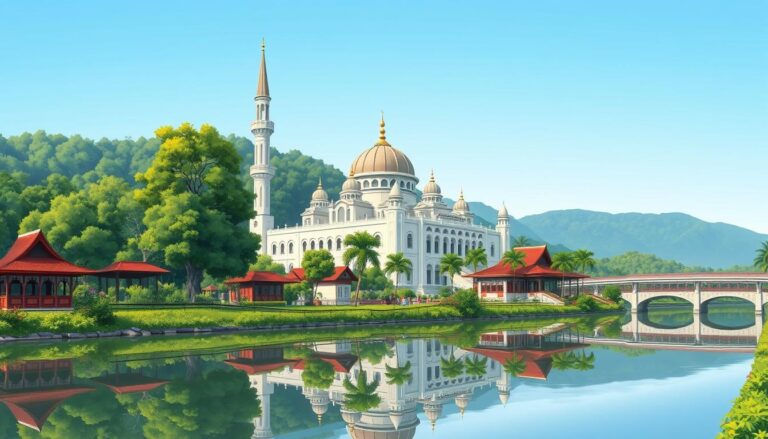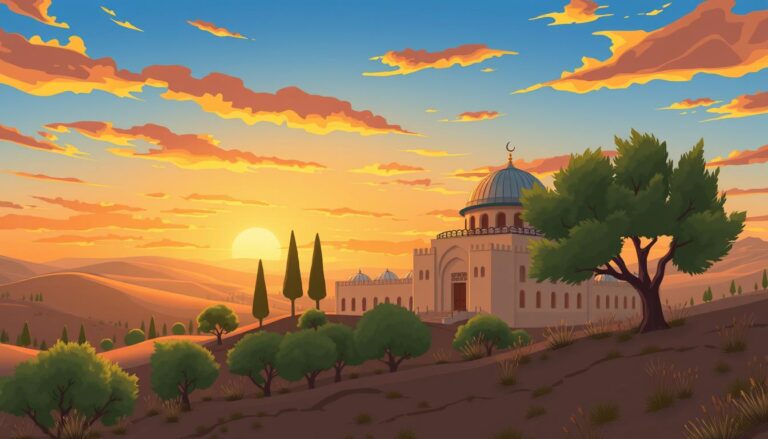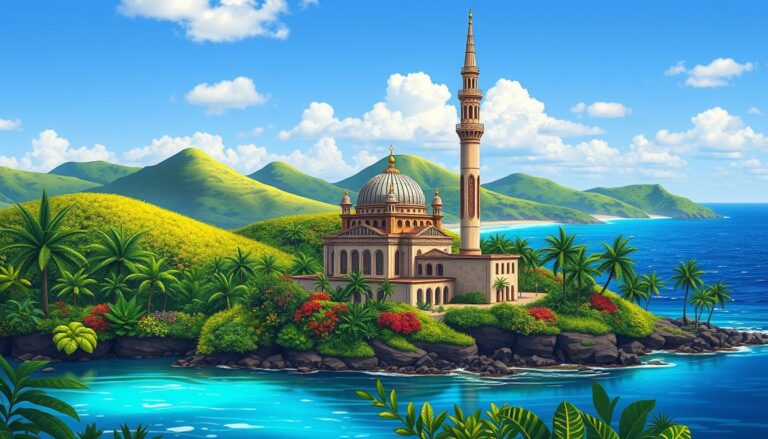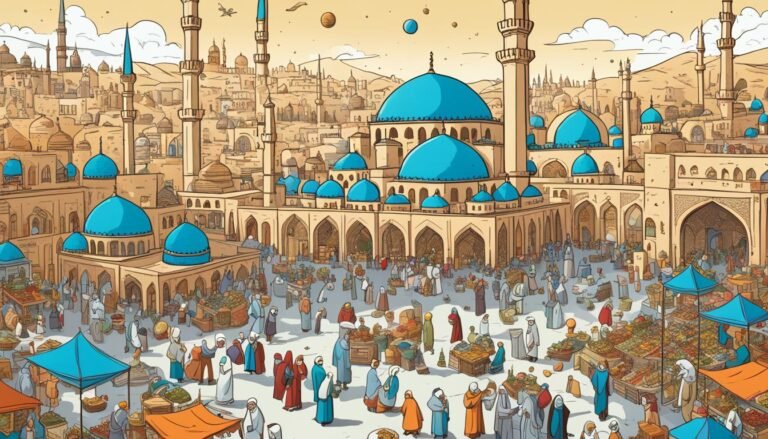Islam in Western Sahara
Western Sahara is a territory in North Africa claimed by Morocco. The CIA World Factbook says almost 100 percent of the people are Muslim. Most of them follow Sunni Islam.
The U.S. government estimates the population at 636,000 as of mid-2019. Almost all of them are Sunni Muslims.
The Moroccan constitution makes Islam the state religion. The King is called “Commander of the Faithful” and protects religious freedom. Despite a few dozen Moroccan Christians and a small group of foreign Roman Catholics, Islam is deeply rooted in Western Sahara’s culture and society.
Islamic Demographics in Western Sahara
The Muslim population in Western Sahara is mostly Sunni, making up about 99.9% of the people. This Sunni Muslim majority has shaped the region’s religious scene for centuries.
Sunni Muslim Majority
Recent estimates show Western Sahara’s population is around 636,000 as of mid-2019. Sunni Muslims make up about 85% of the residents.
Minority Christian Communities
While Sunni Islam is the main religion, Western Sahara also has small Christian groups. There are dozens of Moroccan Christians and a few foreign Roman Catholics. Also, a small group of non-Muslim foreigners work for the United Nations Mission for the Referendum in Western Sahara (MINURSO).
“Prior to 1975, there were over 20,000 Roman Catholics in Western Sahara, but as of 2007, there were only around 100.”
Islamic Practices and Culture in Western Sahara
Islam is a big part of life in Western Sahara. The area has many mosques and religious sites. These places are where people come to pray and meet. Sufi traditions also play a big role, shaping the spiritual and cultural practices of many.
Mosques and Religious Sites
Mosques are key in Western Sahara. They are not just for prayer but also for community events and learning. The mosques show the area’s rich culture, mixing Moorish, Andalusian, and African styles.
Western Sahara also has shrines, zawiyas (Sufi lodges), and cemeteries. These sites are very important to the Sahrawi people. They are the heart of religious festivals and ceremonies.
Sufi Traditions and Influences
Sufi Islam is strong in Western Sahara. Zawiya (Sufi lodges) are centers for learning and spiritual growth. Sahrawi Sufis practice rituals like zikr and sama, honoring Sufi saints.
Sufi traditions are seen in Western Sahara’s art and literature. They are part of the Sahrawi people’s daily lives. These practices make Western Sahara’s Islamic culture unique.
“The Sufi tradition in Western Sahara is a testament to the rich cultural tapestry of the region, blending Islamic spirituality with local customs and beliefs.”
Islam in Western Sahara
Islam is the main religion in Western Sahara, with most people being Sunni Muslim. The Islamic heritage is a big part of the Sahrawi people’s lives. It shapes their culture and how they live together.
The history of Islam in Western Sahara is rich and varied. It’s not just a religion but a key part of Sahrawi culture and identity. The Islamic practices in Western Sahara blend different traditions, including Sufi influences.
Mosques and religious sites are important for the Sahrawi people. They are places for worship, community, and learning about Islam. These places show the strong bond between the Muslim communities in Western Sahara and their faith.
“Islam is not just a religion in Western Sahara, but a way of life that permeates every aspect of our society.”
Islam’s importance in Western Sahara is also seen in the region’s laws. The laws make sure Islam is respected and that everyone can practice their faith freely.
The King’s role as the “Commander of the Faithful” shows Islam’s key place in Western Sahara. This role links the monarchy and Islam, influencing the region’s society and politics.
Constitutional and Legal Framework
In Western Sahara, the laws about religion come from the Moroccan constitution. This constitution makes Islam the state religion. It also protects the right to think freely, speak openly, and gather peacefully. People are also allowed to practice their religious beliefs.
Islam as State Religion
The Sahrawi constitution, first made in 1976 and updated many times, makes Islam the state religion. This rule has stayed the same through updates in 1991, 1995, and 1999. It also makes Arabic the national language, showing Islam’s importance.
Freedom of Religious Practice
Even though Islam is the state religion, the Sahrawi constitution allows for religious freedom. It says political parties can’t be based on religion. It also protects Islam from disrespect or harm. Yet, a small group of non-Muslims, mostly working for MINURSO, live there too.
But, the Moroccan government has limited the rights of religious minorities. They have faced penalties for changing someone’s religion or stopping religious services.
“The constitution establishes Arabic as the national language and Islam as the state religion, while also guaranteeing freedom of religious practice.”
Role of the King as “Commander of the Faithful”
In Western Sahara, the King’s role as the “Commander of the Faithful” is very important. The Moroccan constitution says the King protects Islam and ensures religious freedom. This includes Western Sahara.
The Almoravid Dynasty ruled from 1040 to 1147 and made Maliki Islam the main Islamic school in the area. The Almohad Dynasty, from 1121 to 1269, also played a big role. But, they followed a different Islamic school that focused on the Quran’s literal meaning.
Today, the King’s role keeps Maliki Islam strong in Western Sahara. Morocco has grown its religious ties with Africa, from 5 to 36 between 2012 and 2017. The Mohammed VI Institute in Rabat trains 500 Malian imams to fight extremism and promote Maliki Islam.
The King’s influence reaches beyond Western Sahara. The Grand Mosque of Dakar, built by King Hassan II in 1963, hosts cultural events. The Tijaniyyah Sufi order, popular in Senegal, also has close ties with Morocco. The current Minister of Endowments and Islamic Affairs, Ahmed Toufiq, is part of this order.
The King’s role in Western Sahara shows the strong bond between the Moroccan monarchy and Islam. This bond shapes the region’s culture and religion through various initiatives and partnerships.
“The King holds the Islamic title of ‘Commander of the Faithful’ and is the protector of Islam and the guarantor of the freedom to practice religious affairs in the country, including in the territory of Western Sahara.”
Islamic Education and Teachings
In Western Sahara, education is deeply connected to Sunni Islam. By law, all schools must teach Sunni Islamic principles. This ensures the rich religious and cultural heritage is passed on.
Sunni Islam in Educational Institutions
The Maliki-Ashari school of Sunni Islam is the base for education in Western Sahara. Students learn the core of Sunni Islam from primary to tertiary levels. This helps them understand and appreciate this faith deeply.
- Mandatory Sunni Islamic instruction in public schools
- Integration of Sunni Islamic teachings across various academic subjects
- Emphasis on Maliki-Ashari theological and jurisprudential approaches
- Extracurricular activities and student organizations promoting Sunni Islamic values
This approach to Islamic education in Western Sahara prepares the next generation. They learn about Sunni Islamic thought and practice. This keeps the region’s traditions and cultural identity alive.
Societal Attitudes and Concerns
In Western Sahara, the Islamic society poses challenges for religious minorities. Christian groups face fear of harassment, including family ostracism and ridicule. This makes them practice their faith quietly.
Discretion among Religious Minorities
Religious minorities in Western Sahara walk a tightrope. The country’s constitution promises freedom of religion, but reality is different. Religious minorities in Western Sahara must be careful to avoid discrimination.
Societal attitudes in Western Sahara towards different religions are complex. The Islamic faith’s strong influence shapes cultural norms. This makes minorities hide their beliefs, limiting their freedom to practice openly.
“The fear of social ostracization and ridicule is a real concern for many religious minorities in Western Sahara. They often have to weigh the risks of openly practicing their faith against the desire to freely exercise their beliefs.”
This situation shows the need for understanding and tolerance towards religious minorities. As Western Sahara evolves, addressing these concerns is crucial. It will help create a more inclusive and accepting society.
Government Policies and Practices
In Western Sahara, Morocco’s government tries to keep religious freedom safe. It also makes sure Islam is the main religion. The 2019 Report on International Religious Freedom says there were no big government actions against religious freedom in this area.
The Moroccan constitution protects freedom of thought and religion. This means small Christian and Jewish groups can exist in Western Sahara. But, the government doesn’t like it when people change their religion, especially from Islam. It also doesn’t allow places of worship for Bahai or Shia people in areas it controls.
Even though the government respects religious freedom, it has been criticized. It has been harsh on Sahrawis who want Western Sahara to be independent. Authorities limit what independence activists can do and say.
“The Moroccan Association for Human Rights (AMDH) reported that as of September 15, 2021, authorities had declined to process administrative formalities for 84 out of the 99 AMDH local branches, hampering their operational capabilities.”
Human rights groups have looked closely at the government’s actions in Western Sahara. They worry about the crackdown on free speech supporters. They also are concerned about the use of surveillance technology against journalists and activists.
In summary, Morocco’s government wants to protect religious freedom in Western Sahara. But, there are still worries about how it treats those who want Western Sahara to be independent. There’s also concern about the suppression of different opinions in the area.
International Engagement on Religious Freedom
The world is watching to protect religious freedom in Western Sahara. U.S. officials talk with Morocco about being open to all faiths. They also meet with religious groups in the area.
This shows a global push to protect the right to practice any faith. Western Sahara is mostly Sunni Muslim. But, there are also Christians and others.
This focus on religious freedom in Western Sahara is key. It’s about making sure everyone can believe as they want. This includes talking between governments and different faith groups.
Keeping this engagement going is important. It helps make sure laws in Western Sahara respect all faiths. This teamwork is vital for solving problems faced by religious minorities. It also makes sure government actions match up with world standards of religious freedom.
Conclusion
Islam has a strong presence in Western Sahara, showing its lasting impact. The Sahrawi people deeply follow Sunni Islam. This shapes their culture, society, and daily life.
The Moroccan government tries to protect religious freedom. But, religious minorities like Christians face big challenges. They struggle to openly practice their faith because of societal attitudes and fears.
The mix of Islam, culture, and politics in Western Sahara is complex. The international community needs to work on religious freedom. It’s important to help the Sahrawi Muslim community and ensure everyone can practice their faith freely.
Islam’s legacy in Western Sahara shows the area’s rich culture. It’s important to balance religious freedom, societal norms, and politics. As the region’s future is shaped, we must celebrate diversity and foster understanding and respect.
Source Links
- Islam in Western Sahara
- Western Sahara – United States Department of State
- Demographics of Western Sahara
- Western Sahara – United States Department of State
- Culture of Western Sahara
- Morocco (includes Western Sahara)
- Western Africa – Muslim History, Culture, Traditions
- Western Sahara | Facts, History, Conflict, Map, & Population
- Legitimacy of the Sahrawi Arab Democratic Republic and Moroccan Military Control over Western Sahara from the View of International Law | Ústav mezinárodních vztahů – Expertise to impact
- Constitution of the Sahrawi Arab Democratic Republic
- WESTERN SAHARA 2017 INTERNATIONAL RELIGIOUS FREEDOM REPORT
- Educator of the Faithful: The Power of Moroccan Islam
- Morocco, commander of the (African) faithful?
- The Spread of Islam in West Africa: Containment, Mixing, and Reform from
- Islam in West Africa. Introduction, spread and effects – History Textbook
- No title found
- Understanding Sharia: The Intersection of Islam and the Law
- The Future of the Global Muslim Population
- 2014 Report on International Religious Freedom – Western Sahara | Refworld
- Western Sahara
- World Report 2022: Rights Trends in Morocco and Western Sahara
- Morocco – United States Department of State
- MOROCCO 2020 INTERNATIONAL RELIGIOUS FREEDOM REPORT
- Trade and the Spread of Islam in Africa | Essay | The Metropolitan Museum of Art | Heilbrunn Timeline of Art History
- Western Sahara conflict

